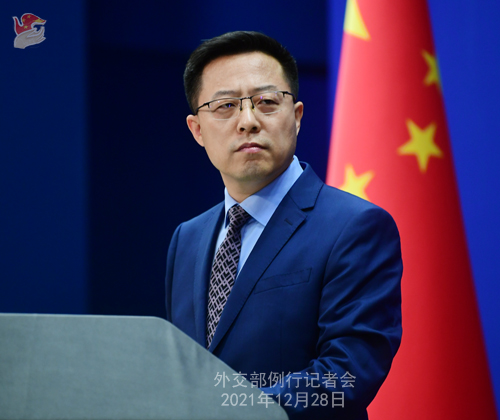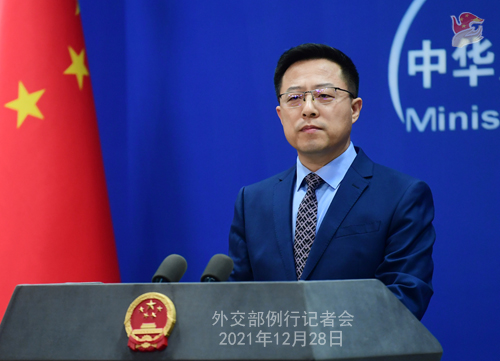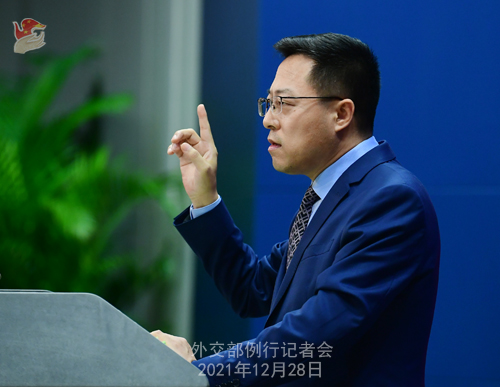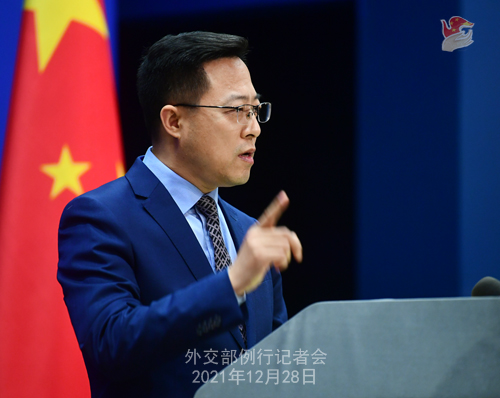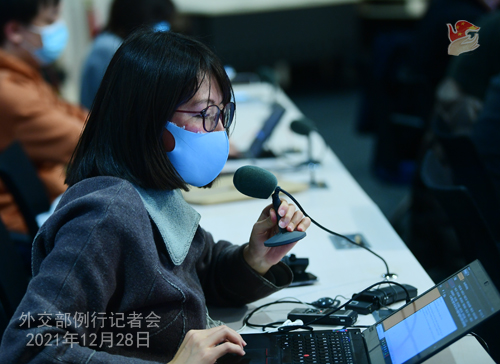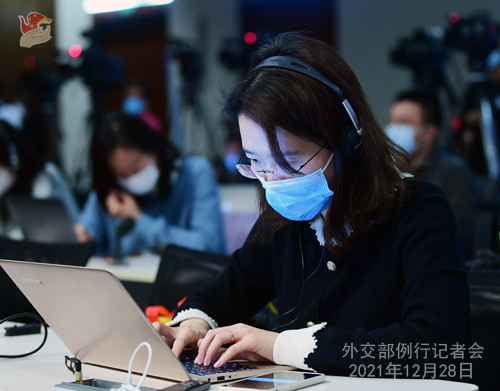| Foreign Ministry Spokesperson Zhao Lijian’s Regular Press Conference on December 28, 2021 |
| 2021-12-28 20:55 |
|
The 17th China-Singapore Joint Council for Bilateral Cooperation, the 22nd China-Singapore Suzhou Industrial Park Joint Steering Council (JSC), the 13th China-Singapore Tianjin Eco-City JSC and the 5th China-Singapore (Chongqing) Demonstration Initiative on Strategic Connectivity JSC meetings will be held via video link on December 29. Member of the Standing Committee of the Political Bureau of the CPC Central Committee and Vice Premier of the State Council Han Zheng will co-chair the meetings with Deputy Prime Minister Heng Swee Keat of Singapore. CCTV: The Economist published an article saying that China unilaterally announced its decision to downgrade diplomatic relations with Lithuania to the chargé d’affaires level and asked Lithuanian diplomats to hand in their Chinese identity cards to have them changed to reflect their mission’s status, thus chasing them from Beijing. Being unable to ensure the diplomatic status of the embassy personnel, and not accepting its embassy’s demotion, the Lithuanian government had no choice but to tell all diplomats and dependents to leave China. Do you have any comment? Zhao Lijian: China “chased” Lithuanian diplomats from Beijing? The allegation is pure defamation. Acting in bad faith, Lithuania openly creates the false impression of “one China, one Taiwan” in the world. This gravely undermines China’s sovereignty and territorial integrity and damages the political foundation for an ambassadorial-level diplomatic relationship. The Chinese side, out of the need to safeguard its core interests and the one-China principle, a basic norm governing international relations, has downgraded its diplomatic relations with Lithuania to the chargé d’affaires level. This is entirely legitimate and reasonable. With relations downgraded to the chargé d’affaires level, China asked Lithuania’s diplomatic representation in China to reapply for identification cards for its diplomats and administrative and technical personnel. This is a normal procedure of China’s support for and management of foreign missions in China, which complies with international law and common practice. It does not affect the normal fulfillment of duties and life of Lithuanian diplomats in China. At the same time, China protects the security and lawful rights of all diplomatic missions in China and their normal operation, including Lithuania’s diplomatic representation, in accordance with the Vienna Convention on Diplomatic Relations. Without prior notification to the Chinese side, the Lithuanian government abruptly decided to pull out all its diplomats from China and spread false information afterwards to shift the blame. China firmly opposes this. Lithuania cannot cover up its repeated erroneous acts even if it resorts to distorting facts and confusing right with wrong. We believe that the international community will adopt an objective and just position and refuse to buy Lithuania’s one-sided story. MASTV: Since President Xi Jinping put forward the Belt and Road Initiative (BRI) eight years ago, high-quality cooperation under this framework has achieved fruitful results and given a strong boost to global development. In September this year, President Xi proposed the Global Development Initiative (GDI), which aims to pursue more robust, greener and more balanced global growth. How do these two initiatives relate to each other? Do they have different focuses in promoting common development? How do they reinforce each other? Zhao Lijian: Both the GDI and the BRI are major initiatives on international cooperation put forward by President Xi Jinping, important practice to build a community with a shared future for mankind, and important global public goods provided by China to the world. Both of them are dedicated to promoting mutually-beneficial and win-win international cooperation and will make important contributions to implementing the 2030 Agenda for Sustainable Development. Both follow the spirit of partnership featuring openness and inclusiveness. China welcomes the active participation of all parties in them. The GDI and the BRI are also independent from each other, each with its own unique focus with regard to the areas and priorities of the cooperation. The GDI aims at speeding up the implementation of the 2030 Agenda for Sustainable Development. It is committed to deepening global development partnerships, promoting international development cooperation and achieving more robust, greener and more balanced global development. The initiative focuses on development cooperation and puts forth eight key areas of cooperation on poverty alleviation, food security, COVID-19 response and vaccines, development financing, climate change and green development, industrialization, digital economy and connectivity with an eye on the most urgent issues faced by countries, especially developing ones, in their recovery amid the pandemic. It proposes a feasible pathway to accelerating implementation of the 2030 Agenda against the backdrop of the COVID-19 pandemic. The BRI is an initiative for international economic cooperation. With connectivity as the priority, it is dedicated to advancing policy, infrastructure, trade, financial and people-to-people connectivity and fostering new growth drivers in the health, green economy, and digital sectors, among others. The initiative promotes “hard connectivity” of infrastructure, “soft connectivity” of rules and standards and “people-to-people connectivity” among partner countries.
Xinhua News Agency: Can you brief us on the significance of the bilateral cooperation meetings between China and Singapore on bilateral relations under the current circumstances? Zhao Lijian: Singapore is China’s friendly neighbor and important partner for Belt and Road cooperation. As COVID-19 continues to drag on and the international and regional situation is undergoing complex changes, China-Singapore relations have kept the positive momentum of growth and manifested robust vitality and strong resilience. In October this year, President Xi Jinping had a phone conversation with Singaporean Prime Minister Lee Hsien Loong and provided important strategic guidance on the development of bilateral ties. The two sides coordinated cooperation in epidemic response and development, boosted respective national development and made positive contributions to regional economic recovery. The bilateral cooperation mechanisms at the vice-premier level are the two sides’ institutionalized communication channel at the highest level. The two countries usually play host to the annual meetings by turns. This communication channel has played an important role in deepening mutually-beneficial cooperation and driving the development in both countries. With the ongoing COVID-19 pandemic, the two sides have agreed that this year’s meetings will also be co-chaired virtually by Vice Premier Han Zheng and Deputy Prime Minister Heng Swee Keat of Singapore. After the meetings, the two sides will hold a ceremony to unveil the name of a newborn giant panda cub in Singapore. The meetings will be an important occasion for high-level strategic communication between China and Singapore. The two sides will re-calibrate the course of bilateral ties in light of the new circumstances, and identify more areas where our interests align and more growth points in cooperation. Together, we will open up a new prospect for mutually beneficial and win-win cooperation in the new era and make new contributions to the building of a closer China-ASEAN community with a shared future. Global Times: A cluster outbreak of COVID-19 has been reported at Camp Hansen in Okinawa where US troops are stationed. More than 200 US Marines have tested positive. As of December 25, 10 local Omicron cases have been registered in Okinawa with connections to the outbreak. Even under such circumstances, a large number of US military personnel are still seen visiting bustling streets and entertainment venues in Okinawa without wearing a mask. Do you have any comment? Zhao Lijian: I have noted relevant reports. The unruly and wilful behaviour of US personnel stationed in Okinawa poses a severe threat to local people’s health and has triggered strong indignation and disapproval in Japan. As the COVID-19 pandemic continues to rage across the globe, epidemic prevention and control remains the urgent task for all countries. With military bases all around the world, the US has the largest number of military personnel stationed overseas. It has the responsibility and obligation to run a tight ship and make sure its personnel duly respect and comply with local epidemic prevention requirements. Regrettably, we have seen US troops violating regulations and arrogating privileges to themselves time and again. Just last year, for example, there was a scandal involving confirmed cases among US military based in Japan concealing their travel records to evade epidemic prevention requirements. In September this year, the US exempted all troops to be stationed in Japan from COVID-19 screening obligations on the ground that they had been fully vaccinated. Besides, it has also been exposed that US forces stationed in the Republic of Korea violated epidemic prevention regulations and harassed tourists at scenic spots. If such incidents keep occurring, I wonder how many unnecessary obstacles will local authorities have to deal with in epidemic prevention and control and how much extra work will be added to the global fight. To provide security guarantee has always been a high-sounding excuse for the US to station troops overseas. But if US military personnel cannot manage to guarantee epidemic security, or even become a source of hazards and risks themselves, then they are jeopardizing the life and health of the people in their host countries, and one cannot help but question the credibility of the US’ security commitment. CNR: The UN Committee on the Peaceful Uses of Outer Space said the other day on its official website that on December 3, the Permanent Mission of China to the UN and other International Organizations in Vienna sent a note verbale addressed to the Secretary-General of the United Nations, informing him that Starlink satellites launched by Space Exploration Technologies Corporation (SpaceX) of the US had two close encounters with the China Space Station this year, posing a threat to the safety of the astronauts in the station. Could you confirm this? As a State Party to the Outer Space Treaty, what international responsibility should the US assume for relevant activities? Zhao Lijian: I can confirm that Starlink satellites launched by SpaceX of the US had two close encounters with the China Space Station in July and October this year respectively when Chinese astronauts were working there. For safety considerations, the China Space Station implemented preventive collision avoidance control. The 1967 Outer Space Treaty, which is widely recognized as the cornerstone of international space law, stipulates that “States Parties to the Treaty shall regard astronauts as envoys of mankind in outer space”; respect and protect their safety; “immediately inform the other States Parties to the Treaty or the Secretary-General of the United Nations of any phenomena they discover in outer space ... which could constitute a danger to the life or health of astronauts”; and “bear international responsibility for national activities in outer space” conducted by their private companies. To fulfill its Treaty obligations and ensure the safety of astronauts, the Chinese government informed the UN Secretary-General of the above dangerous phenomena as well as the measures taken by the Chinese side on December 3 through its Permanent Mission to the United Nations in Vienna and requested the Secretary-General to circulate the information to all States Parties. The US claims to be a strong advocate of the concept of “responsible behavior in outer space”, but it disregarded its Treaty obligations and posed a grave threat to the safety of astronauts. This is typical double standard. Exploration and peaceful uses of outer space is a common cause of all humanity. Guided by the vision of advancing the welfare of all, China is committed to peaceful uses of space. The US should respect international order in space based on international law, take prompt measures to prevent such incidents from recurring, and act responsibly to safeguard the safety of in-orbit astronauts and the safe and steady operation of space facilities.
Phoenix TV: First, High Representative of the European Union for Foreign Affairs and Security Policy Josep Borrell published an article on the website of the European External Action Service on December 27 to review the work and international landscape in 2021. It noted that, “On China we maintained EU unity, recognizing that the EU sees the country as a partner, competitor and systemic rival, all at the same time. In 2021, the worsening of the human rights situation inside China, its regional behaviour, as well as the decision to sanction MEPs and other EU official bodies and most recently its coercion of Lithuania have all taken their toll.” Do you have any comment on that? Second, Russian Foreign Minister Sergei Lavrov said on December 27 that the West does not want to have any comparable rivals with similar influence in the international arena. This attitude of the western countries explains this “hysteria towards the rise of China”. China has accepted the rules of the game that the West introduced and with the western rules “surpassed the West in her own stadium”. Do you have any response? Zhao Lijian: On your first question, China-EU relations have encountered some setbacks and difficulties this year. The main reason is that the EU insists on unilateral and illegal sanctions against China based on false accusations and disinformation, which has led to a situation that neither side wants to see and taught us a profound lesson. In 2019, the EU issued a policy paper on China, which described China as a partner, competitor and systemic rival. The EU should also reflect on what impact this has had on China-EU relations and beyond. As two major independent forces in the world, China and the EU share broad strategic consensus and common interests. Cooperation between the two sides far outweighs competition, and our areas of consensus far exceed differences. Partnership can solve difficulties, while rivalry can only create difficulties. We hope that the EU will respect facts, respect China, have a correct understanding of China, grasp the mainstream of China-EU relations and the key feature of win-win cooperation, and jointly promote the sound and steady development of China-EU relations so that we can make joint contributions to world stability and prosperity. Regarding what you mentioned about China-Russia relations, we appreciate Russian Foreign Minister Sergei Lavrov’s relevant remarks. China follows an independent foreign policy of peace. China is always a builder of world peace, a contributor to global development, a guardian of international order and a provider of public goods. It actively promotes the building of a new type of international relations and a community with a shared future for mankind. I want to stress that the China-Russia comprehensive strategic partnership of coordination for a new era has weathered all kinds of tests and stands rock solid. In the meantime, the purpose of China-Russia cooperation has never been to defeat anyone, but to promote the development of both countries and deliver win-win results to all parties. We stand ready to work with Russia and the rest of the international community to firmly uphold the international system with the UN at its core and the international order based on international law, support and practice multilateralism, encourage deepening mutually beneficial cooperation between countries, continuously inject new impetus into and provide more stabilizing forces to world peace and development. Reuters: Japan’s government today released its plan for releasing contaminated water from the Fukushima nuclear plant into the sea. The plan includes compensation standards and the compilation of a safety assessment report. Do you have any comment on this latest plan? Zhao Lijian: China is gravely concerned over the plan for discharging the nuclear contaminated water into the sea announced unilaterally by Japan. We have repeatedly stated our position on relevant issues and lodged representations with the Japanese side. China firmly opposes the decision Japan made unilaterally without exhausting safe disposal means, disclosing all relevant information, holding full consultation with neighboring countries and international organizations, or getting domestic and international approval. It is China’s consistent position that Japan should earnestly respond to the concern of the international community including its neighboring countries, withdraw the ocean discharge decision as soon as possible and stop all preparatory work. Associated Press of Pakistan: Pakistan launched a pavilion on JD.com last week. What is the significance? Do you have any comment on it? Zhao Lijian: We noted relevant reports and welcome that. China and Pakistan are all-weather strategic cooperative partners and iron-clad brothers. China has been Pakistan’s largest trading partner since 2011, and Pakistan’s export to China has been expanding rapidly in recent years. We stand ready to work with Pakistan to step up cooperation on cross-border e-commerce and digital trade, facilitate more premium Pakistani specialties in entering China’s market, take real actions to promote high-quality development of bilateral economic and trade cooperation and bring more benefits to the two peoples.
MASTV: According to reports, on December 27, US President Biden signed into law the $770 billion National Defense Authorization Act, or NDAA, for fiscal year 2022, which contains some provisions on China. Do you have any comment? Zhao Lijian: The act you were referring to is essentially domestic legislation of the US. However, we firmly oppose the US slipping in negative content concerning China or making an issue out of China for political manipulation. We urge it to discard the obsolete Cold War zero-sum mentality and ideological bias and look at China’s development and China-US relations in an objective and rational light. It shall not implement negative content and articles in the act that target China and damage Chinese interests or hurt overall bilateral ties and cooperation in important areas. The Paper: We noted that the Voice of America (VOA) published an annual report for 2021, accusing China of undermining human rights and rule of law in Hong Kong and committing genocide in Xinjiang. Do you have any comment? Zhao Lijian: The VOA always turns a blind eye to facts and views China with prejudice. It wouldn’t have any good word for China in its reports, not by any stretch of the imagination. It is also interesting that a journalist who worked for the VOA recently said that when he came to China, he realized that the real situation is the opposite of what he read to his VOA audience every single day. He added that the recent leadership of the VOA was changed because they were promoting more pro-China news. It’s deeply troubling that the VOA hire people who don’t care to understand China as it is to comment and report on China with lengthy and extensive coverage. The relationship between the VOA and the US government is open knowledge to all. Bearing that in mind, it’s not difficult to understand the way it works. For quite some time, the VOA has danced to the tune of the US government to oppress and contain China by politicizing and stigmatizing a wide array of issues. From starting trade frictions to coining the “China virus”, from hobbling Chinese high-tech companies to not sending government officials to the Beijing Winter Olympics, from accusing China of repressing freedom to hyping up the so-called human rights issues in Hong Kong and Xinjiang, the VOA’s finger of politicization has touched numerous areas including economy and trade, COVID-19 response, science and technology, sports, news and human rights. I want to stress furthermore that politicization is a “fine tradition” of the US. The China Society for Human Rights Studies (CSHRS) published a report titled “US Politicization of Human Rights Erodes Foundations of Human Rights Governance” yesterday. It underscored that the US has always viewed human rights as a tool to promote its foreign policy, both when it snubbed and rejected the subject in the early stage and when it wielded human rights to infringe upon other countries’ sovereignty later. The politicization of human rights by the US and the VOA have had a devastating impact on the world, pushing one country after another into the abyss of social turmoil. People across the world will only see with increasing clarity the true face of the US hidden behind the mask of “human rights defender”.
Bloomberg: Taiwan’s “Ministry of Foreign Affairs” said it strongly condemns that Nicaragua has “embezzled” Taiwan’s assets including its former “embassy” on December 27 and handed them over to Beijing. Does the foreign ministry have any comment? Zhao Lijian: First I need to point out that there is no “Ministry of Foreign Affairs” in Taiwan, only provincial authorities in charge of foreign affairs. There is only one China in the world and Taiwan is an inalienable part of China’s territory. Ever since its founding, the Government of the People’s Republic of China has been the sole legal government representing the whole of China, Taiwan included. This is an unshakable historical and legal fact. According to basic principles of international law including respect for national sovereignty and territorial integrity, all state assets of China, whether in China or overseas, are property of the PRC Government. This has been widely recognized throughout many years of diplomatic practice. China highly appreciates Nicaragua’s act of justice showing respect for China’s sovereignty and commitment to the one-China principle. The Taiwan authorities attempt to achieve its sinister agenda by playing the trick of giving away China’s state assets, which is illegal, null and void and will never work. MASTV: According to reports, on December 27, after China’s Ministry of Foreign Affairs confirmed that it had received visa applications for US government personnel to travel to China for the Beijing Winter Olympics, the US National Security Council spokesperson said that the position the US government announced earlier this month will not change. There will be no diplomatic or official representatives from the US. Any suggestion otherwise is false. Any visa application would be for those consular and diplomatic security personnel. It is standard to have those personnel on the ground, and those personnel do not constitute official or diplomatic representation at the Games. I wonder if China has any comment on this? Zhao Lijian: That’s a long question to which I have a short answer. The US claims it won’t send any diplomatic or official representatives to the Beijing Winter Olympics while at the same time applying for visa for officials from government agencies including the State Department and Defense Department. This is rather baffling. No matter how the US twists and turns in an attempt to justify itself, the fact is there for all to see. We once again urge the US to follow the Olympic spirit, avoid politicizing sports and stop making wrong comments or taking wrong moves to disrupt the Beijing Winter Olympics.
|
